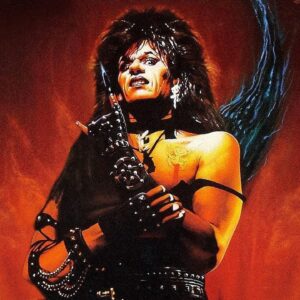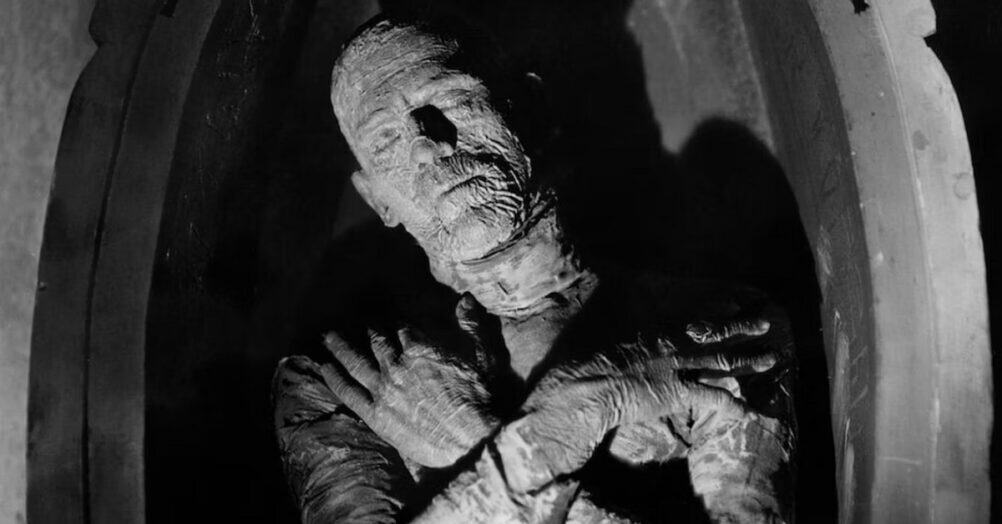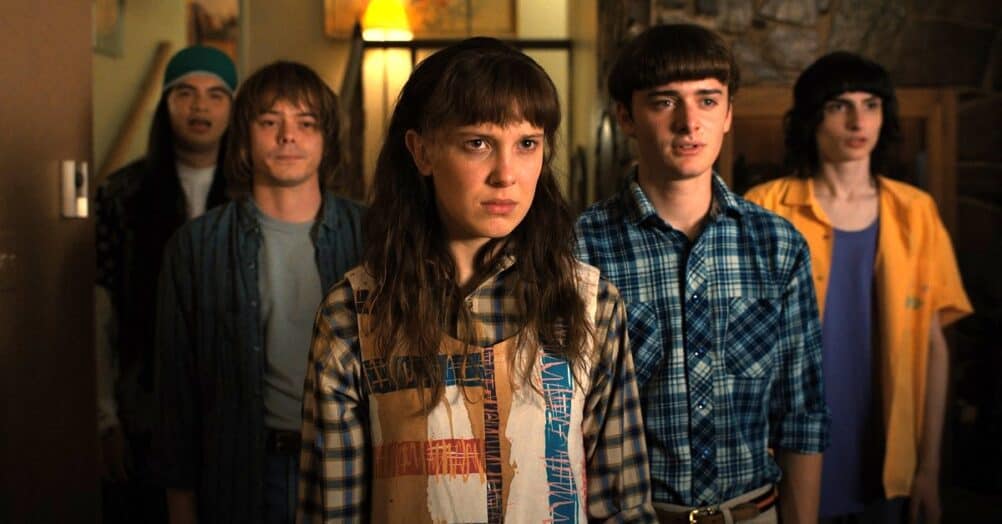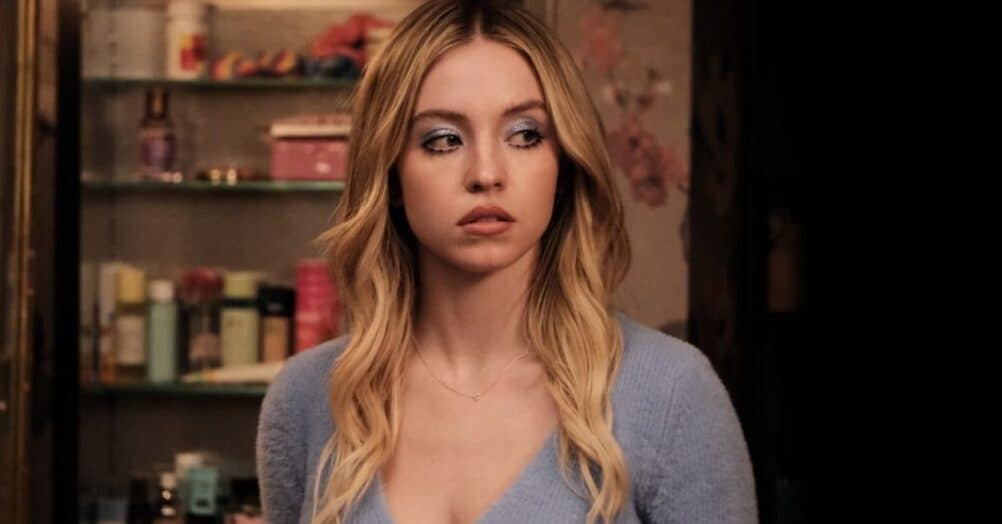Last Updated on November 7, 2024
The 1980s. MTV ruled the airwaves, bringing a steady stream of music into the homes of impressionable young viewers, and a lot of parents were freaking out. Satanic panic was at its peak, with some fearing that the so-called “devil’s music”—rock and roll—would ruin lives and drive youngsters to do terrible things. Ozzy Osbourne and Judas Priest were being accused of encouraging fans to commit suicide. The Parents Music Resource Center compiled a list of objectionable songs and demanded that the music industry set standards that musicians would have to abide by, a movement that led to Dee Snider, Frank Zappa, and John Denver having to testify at a Senate hearing. All of this madness helped inspire one of the greatest underseen horror movies of the decade, the 1986 release Trick or Treat, which we’re looking at in this episode of The Best Horror Movie You Never Saw.
Directed by Charles Martin Smith from a screenplay by Rhett Topham and producers Michael Murphy and Joel Soisson, Trick or Treat stars Marc Price, who at the time was playing the nerdy character Skippy on the classic sitcom Family Ties, as bullied metalhead teen Eddie Weinbauer. There are only two things that get Eddie through his miserable existence: his unrequited crush on the nice, popular girl Leslie, played by Lisa Orgolini, and his fandom for rock star Sammi Curr, who has such a wild stage show—which includes biting the head off a snake and playing with its blood—he even had to defend himself at a Senate hearing. Sammi Curr is from Eddie’s hometown, went to the same high school, and Eddie idolizes him because he rose above it all. Under the pen name “Ragman,” Eddie sends Sammi letters pouring his heart out to his hero.
Real rock stars Gene Simmons and Ozzy Osbourne are in the film’s cast, but in supporting roles. Simmons pays homage to Wolfman Jack with his character, radio DJ Nuke, while Osbourne is cast very much against type as a clean-cut anti-rock evangelist. The role of Sammi went to Solid Gold and A Chorus Line dancer Tony Fields, who was advised to hang out with musicians and study rock stars to emulate their style and attitude. Of course, that means someone else had to provide the songs performed by Sammi, and the band chosen for his music was Fastway, with Sammi’s singing voice provided by Dave King, who later formed the band Flogging Molly.
Sammi was planning to play the high school Halloween dance, but the town council blocked his appearance. It didn’t matter in the long run, as Sammi doesn’t live to see Halloween, falling victim to a hotel fire. He leaves behind one last unreleased album called Songs in the Key of Death, and the only copy is a studio demo on an acetate disc sent to Nuke, with instructions for it to be played on his radio station at midnight on Halloween night. Nuke makes a tape copy and gives the acetate disc to Sammi’s biggest fan, Eddie.
The film enters horror territory when Eddie realizes there are backmask messages hidden on the album. By playing the record backwards, he can communicate with Sammi from beyond the grave. At first, this is positive for him, as Sammi’s advice and encouragement help him stand up to his bullies, led by Doug Savant as preppy jerk Tim, and get back at them for their torment. But Sammi soon takes things too far, and Eddie realizes he’s dangerous. When Eddie tries to cut off communication, the spirit of Sammi emerges through his stereo system, revealing himself to be more powerful and a bigger threat than Eddie imagined. Sammi is exactly the kind of rock star parents of the 80s were so concerned about. He practiced the occult, made a deal with the devil, and his evil spirit lives on through the music recorded for Songs in the Key of Death. When the album is played over the radio on Halloween night, he will have the power to emerge through any radio in town and kill anyone he encounters. He’s out to raise hell in his hometown and first plans to wreak havoc at the Halloween dance.
The initial idea for Trick or Treat came from legendary producer Dino De Laurentiis, but at this point, it didn’t have anything to do with rock music. De Laurentiis was apparently one of the few people who had been impressed by A Nightmare on Elm Street Part 2: Freddy’s Revenge when it was released in 1985, so he approached the film’s line producers, Michael Murphy and Joel Swasson, with the project that would be titled Trick or Treat, needed to be ready for theatrical release on October 24th, 1986, and could possibly be about a killer who goes door to door on Halloween night while wearing a pumpkin on his head. Murphy and Swasson were on board to have a movie called Trick or Treat ready for a Halloween ’86 release, but they weren’t interested in making a slasher movie like De Laurentiis had pitched to them. That idea sounded like De Laurentiis was trying to cash in on Halloween, which would make sense since he was involved with Halloween III: Season of the Witch. But what he was saying from the start was that he wanted a movie that would feature the next Freddy Krueger, not the next Michael Myers. That’s why he went to the Freddy’s Revenge guys.
So, Murphy and Swasson convinced him to ditch the simple slasher idea and go with something that had a supernatural angle to it, and that’s when writer Rhett Topham came in with a pitch that blended the supernatural with rock and roll. Topham originally envisioned a film that would be much darker than the one that was made in the end, although the first name he had in mind for the evil rock star was Chilly Willy, just like the cartoon penguin. He imagined his story would be the next Exorcist, but then Trick or Treat evolved into something campier and more satirical. But this wasn’t a case of a story being taken away from the writer and turned into something they didn’t approve of. Topham was totally on board with the tone of the finished film, even if it wasn’t as dark as he first imagined. As he said in an interview 20 years later, “One day the producers convinced me that the spirit of this movie was more about kicking back, grabbing a six-pack, maybe a bong, and watching Eddie scramble to re-cork the genie’s bottle he ultimately unleashed. With Sammi Curr morphing out of stereo speakers and shooting death rays from his guitar, could it be anything else?”
Also playing into the film’s lighter tone is the fact that director Charles Martin Smith wasn’t a big horror fan. He had enjoyed the genre when he was younger, but The Exorcist scared him so badly it put him off watching horror for the next decade. Murphy and Swasson had already looked at over 40 different potential directors for Trick or Treat before they heard that Smith, who is best known for his acting roles in films like American Graffiti and The Untouchables and had about 15 years of screen credits to his name at that point, was also interested in directing. They set up a meeting, and during their conversation, they were convinced that Smith was a match for what they had in mind for Trick or Treat. The actor was hired to make his feature directorial debut with this film. He wasn’t a genre fan, but he wasn’t getting any other directing offers, so he took the job. Smith has continued to direct film and television since, but aside from directing the pilot episode of Buffy the Vampire Slayer, he has stayed away from horror. He’s even shied away from calling Trick or Treat a horror movie, but he also didn’t want to call it a comedy. His description for the film: “This is a rock and roll monster movie.”
The producers did approach actual rock stars about playing Sammi Curr, but as Soisson has said, “We got very negative feedback from these people. They read this whole satanic rock star thing as very negative, and that wasn’t what we wanted to do. So we went back and clarified our own personal beliefs. What comes out of the story is not to go along with the blind hero worship and also to be cautious about the very, very dangerous situation of the PMRC-type mentality.”
Once the filmmakers made it clear that Trick or Treat wouldn’t be a condemnation of rock and roll, they were able to get Gene Simmons and Ozzy Osbourne involved. Simmons already had acting experience, so he was able to come in and perform his scripted lines like any other actor in the cast. The situation was different for Ozzy’s cameo. This was something new for him to be doing, so Smith didn’t even give him a script. He just brought Ozzy onto set and had him ad-lib his lines as an anti-rock evangelist. Ozzy really got into it and gave Smith about 45 minutes of material to work with, which was whittled down substantially for his appearance in the film.
Blackie Lawless of W.A.S.P. was reportedly interested in playing Sammi Curr until he found out that Fastway had already been hired to provide the music for the character, and he didn’t want to lip-sync to another band’s songs. In the end, the producers felt it would have been too distracting to have a musician the audience was already familiar with in the role of Sammi anyway. Viewers would know an established rock star was just goofing around and having fun playing the character, but they would be able to buy Tony Fields as the character without any baggage getting in the way. Fields was so convincing with his rockstar act, he even impressed the real rock stars in the cast. He told Fangoria: “Ozzy and Gene never saw my work, but they were very, very supportive of what they saw as my look. I did a photo session with both of them, and I got nothing but compliments on how authentic I looked and how I handled the guitar and myself as a rock star.”
Marc Price has said that his competition for the role of Eddie Weinbauer included Keanu Reeves, which seems logical since the producers would go on to cast Reeves as another music-obsessed teen in Bill and Ted’s Excellent Adventure a few years later. But Swasson said he never met Reeves until the audition for Bill and Ted, so someone is mistaken about when Reeves entered the picture. But either way, Price and Reeves were both perfectly cast in the two movies. Rhett Topham wrote the Eddie character as a reflection of himself. Eddie is Topham’s middle name, and Price was dressed and groomed just like him.
While Eddie looked like the writer, the actor who played his best friend, Roger, actually was a writer on the film. When Murphy and Swasson wanted to punch up the dialogue in the script, they turned to the writing duo of Glen Morgan and James Wong, who they had worked with on a great thriller called The Boys Next Door the previous year. Then they went a step further and suggested that Morgan audition for a part in the movie, and he ended up being cast as Roger, without Smith knowing that he was friends with the producers or had worked on the script. Morgan didn’t pursue an acting career after this, but he later described his time on the set of Trick or Treat as the best six weeks of his life. He and Wong went on to work on The X-Files, Final Destination, and Final Destination 3 together, and Morgan himself directed the 2003 version of Willard and the 2006 Black Christmas remake.
Trick or Treat seemed to enjoy a relatively smooth production. Smith said making the movie was a hoot, even if working with all the special effects would occasionally get exhausting. Made on a budget of $3.5 million, the film was ready for its October 24th, 1986 release date and ended up pulling in just under $7 million at the box office. Then came more money from the VHS rentals. Smith told HollywoodChicago.com that De Laurentiis “really loved the movie because it turned a profit. He would come up to me and say, ‘Charlie, bravo, bravo.'”
Trick or Treat had some success in the second half of the ’80s and developed a cult following, but it has largely faded into obscurity over time. This is probably because it has never gotten a great DVD or Blu-ray release. When it did reach the DVD format, it was in full screen on a bare-bones disc. It has been put on Blu-ray in a few countries, but even then, it wasn’t the special edition packed with bonus features that the movie deserves. Fans are holding on to the hope that we’ll see an awesome release of Trick or Treat someday, one with the interviews, documentaries, commentaries, and maybe that deleted scene of Eddie daydreaming that he’s Conan/Frank Frazetta-style barbarian, which we only know about because a picture from the scene was published in an issue of Fangoria.
Trick or Treat deserves the special edition treatment because it’s an incredibly entertaining film propelled forward by a fun ’80s rock soundtrack. It starts out like a coming-of-age drama. The script, Smith’s direction, and Marc Price’s terrific performance work together effectively to get us to care about Eddie Weinbauer and to root for him to stand up against his bullies and end up with Leslie. But there’s a dark edge to it all, and Eddie’s beyond-the-grave interactions with Sammi get creepier and creepier as the film goes on. Then, when Sammi has reached peak creepiness and re-entered the world of the living as a burn-scarred homicidal maniac, the movie goes completely nuts in the second half. When Topham talked about Sammi morphing out of speakers and shooting death rays out of his guitar, that was an accurate description of what happens in the second half of the movie. While this is over the top compared to the approach taken in the first half, it doesn’t feel out of place because the movie has a sense of humor about itself every step of the way. As Smith said, he shied away from going too dark with the material; though his hesitancy to get too scary and intense, he did end up striking a good balance of laughs and unease before just letting the movie go wild.
Some viewers may prefer the tone of one half of Trick or Treat over the other, but as a whole, it works. The movie is a blast to watch—a rock-and-roller coaster ride. One of the craziest and best scenes in the movie involves a demon called Skeezix, who is Sammi Curr’s mascot, much like Iron Maiden has a mascot called Eddie the Head. The appearance of Skeezix seems to come out of nowhere for some viewers because the movie doesn’t do the best job of establishing him as Sammi’s mascot, even though Sammi does have a tattoo of the creature on his chest. But whether or not you’ve taken note of the demon before, the scene where it emerges into our world is certainly unforgettable. Eddie has made a tape copy of Songs in the Key of Death for Tim, calling it a peace offering. But the person who ends up listening to the tape is Tim’s status-obsessed girlfriend, Genie, played by Elise Richards. At first, this seems to be quite a pleasurable experience for her, but it’s just Sammi and the forces of evil messing with her, seducing her into a trance before putting Skeezix in her face and melting her ears to her headphones.
Trick or Treat is packed with really great sequences, including the scenes where Eddie stands up to Tim and his lackeys, a moment where Sammi, speaking through Eddie’s stereo system, tries to lure Eddie’s mom (played by Elaine Joyce) into entering the room—which would not be good for her—those Gene Simmons and Ozzy Osbourne cameos, and all the action packed into the second half. The action begins with Sammi taking the stage at the high school Halloween dance for a deadly performance of his song, the title track, “Trick or Treat.“
Trick or Treat (1986) is worth watching again and again, especially during the Halloween season, and it deserves to have a lot more horror fans checking it out on an annual basis. Hopefully, it’ll receive the Blu-ray release it deserves before much longer so it can reach a whole new set of fans, and so the fans it already has can celebrate it to a higher degree than ever before. If you’re a fan of ’80s horror rock and roll, it’s highly recommended that you seek out Trick or Treat as soon as possible. And if you’re worried that it plays into the concerns of satanic-panic PMRC parents too much, let Charles Martin Smith assure you when he says, “The point we’re trying to make in this movie is that rock and roll is not bad, and that although Sammi may have become an insane, demented demon back from the dead out to kill people, that doesn’t mean Eddie should stop listening to heavy metal.”
And as Rhett Topham told SammiCurr.com, “This movie is not the typical horror flick, so it’s really ours, just for us metalheads, rock’s chosen warriors, and there’s no other like it.”
Some previous episodes of the Best Horror Movie You Never Saw series can be seen below. To see more, and to check out some of our other shows, head over to the JoBlo Horror Originals YouTube channel – and subscribe while you’re there!


















Follow the JOBLO MOVIE NETWORK
Follow us on YOUTUBE
Follow ARROW IN THE HEAD
Follow AITH on YOUTUBE